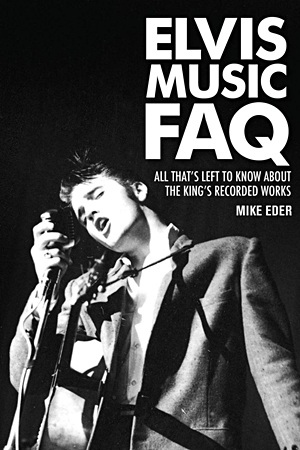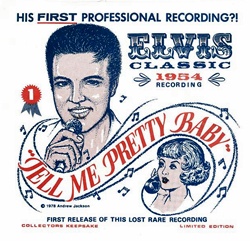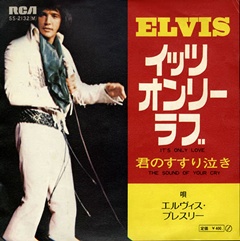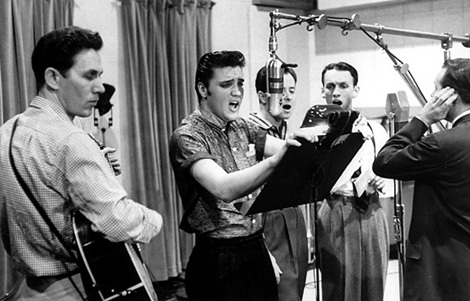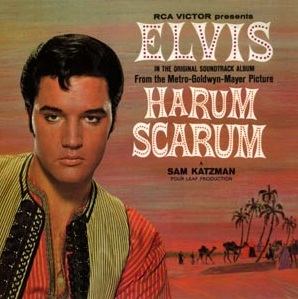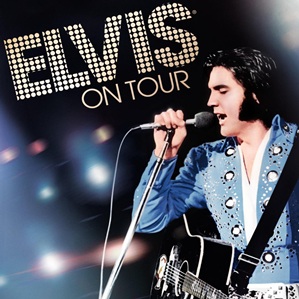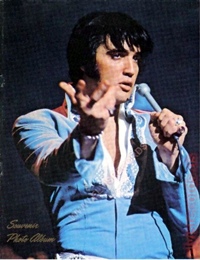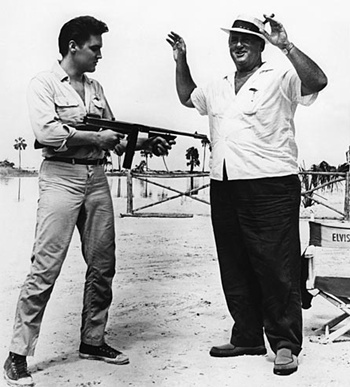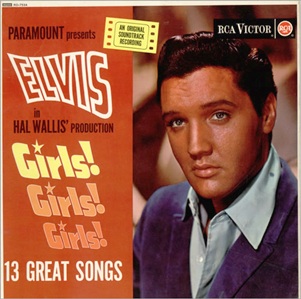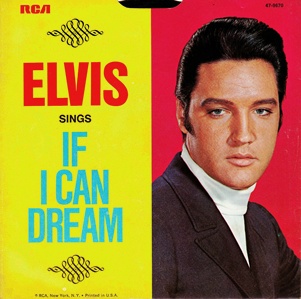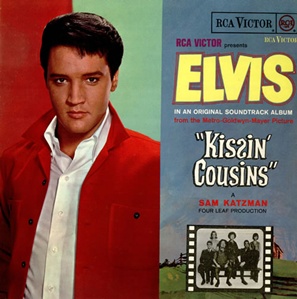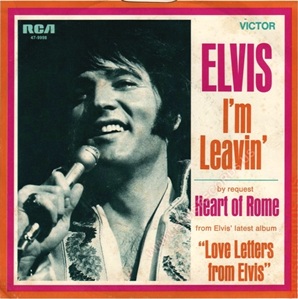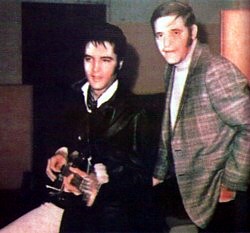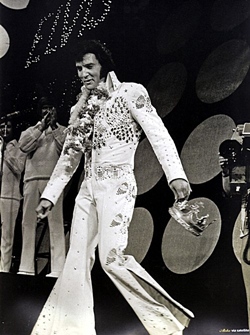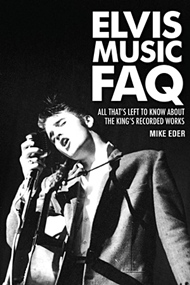 |
 |

Elvis Music FAQ is the upcoming book by author and Elvis expert Mike Eder. High-quality photo-books seem to have dominated Elvis publishing recently so it's great to see a new book coming out purely about Elvis' music. Mike Eder: It is because I am a completest by nature. I basically used my Elvis record collection to write this book. I have read over 300 Elvis books myself so I knew what really had NOT been said. Or at least I didn't feel it was said in the same way. I do cover every song and make some sort of comment on each one. I did draw the line on home recordings as they weren't really meant for public consumption and truthfully there is too much we just don't know about to cover them as definitively as I like to generally. Every tour is mentioned and given a review of sorts, all the films, and every major record, LP, EP, or 45, released during Elvis' lifetime. The FAQ series of books tend to cover some quirky stuff and I also had fun doing chapters on "borrowed" songs, records made by imposters, etc (see below left). I always try to be accurate on my dates and most importantly to have a balanced perspective. I am hard on myself that way but the great thing about doing an FAQ book is that you can take your subject seriously without losing the reader. These aren't dry reference books, but rather meant to be thought provoking and fun. I want there to be a degree of entertainment for the reader. I know what I like as a fan of Elvis, and music books in general, so I try to make it a book people will want to thumb through again. At the same time I put basically as much information as a typical reference book might have. Whether you have one scratchy 45 and a Christmas comp CD, or every pressing known to man, I aimed to make it work for any kind of Elvis listener. I want it to be a different sort of project in that any sort of fan can take something away from it.
EIN - Do you have a favourite period 50's, 60's or 70s? Mike Eder: Well my very favorite Presley recordings generally come from 1954-60 and then 1968-72. I like a lot of stuff from 1961-67, and bearing in mind his troubles at the time, I also find much to enjoy during the later years. Though from a live standpoint the pickings get slim by 1976. Still I think the two periods I mentioned are when Elvis was enjoying what were ultimately two different kind of peaks. There is no secret that Elvis was a great artist who made some bad records. I try to make sense of those and maybe try to understand how many of them came about. Elvis must bear the blame for making some bad decisions, yet I have no anger or disgust at him for not always making the best choices.
EIN – Throughout his career Elvis performed so many different types of music, do you think that your reviews might reflect your own taste in music? Aside from the kind of historical factual information that a responsible writer does not let their own feelings color, I ignore other critics and try to tell the story that I get from the music personally. My own take on the whole Elvis Presley story is different than those that have been published before and I hope that's why I have been able to gain readers over the years. I don't want to come off like my tastes are more definitive than anyone else's, I only want to make a case for what moves or doesn't move me. EIN - What about Elvis' key SUN sessions - is there anything more to discover? Mike Eder: I never say never. I have no insider information on it, but in being a fan and researcher on Elvis' for so many years there are songs I think may be more likely to exist. "Tiger Man" and "Satisfied" are two I feel have a small chance of showing up. Very shaky info exists but "Uncle Penn" may even be a reality. All speculation on my part mind you. One thing did exist and that was Gary Pepper having a recording of the "Southern Made Donut" ad. Phil Gelormine had heard it at his house but the tape is probably gone now. One quick aside is that I envy all who are going to soon discover the SUN period in any meaningful way. It is still hard to believe how much good music came out of that label, and Elvis is just a part of that story. Maybe, ultimately, the most important part but there is just so much for future generations to uncover, if only from the standpoint of hearing it for the first time. Again I envy that first thrill of "That's All Right" coming on. Mike Eder: Well that is really the main thing. I have had good response to writing about Elvis. I care about his work, and I care that he be seen as an actual real person and artist. I make a point to never judge him. Having said that I do not flinch from the dark moments when I have to confront them. I think I just tell it in a way that takes a different view. I have no doubt that I would have had serious issues if I had the kind of fame Elvis had. Most anyone would. EIN - Elvis' legacy covers all bases - Movies, Televison, fashion, even something as crazy as jumpsuits - why do you think Elvis' music is worthy of a stand-alone book? EIN - Of course there have been key books about Elvis' music already - such as Ernst Jorgensen's 'Life In Music', Ken Sharp's 'Writing For The King' or Tunzi's 'Sessions' - what will your 'Elvis Music FAQ' offer to fans? EIN - Will your book cover all of Elvis' recording sessions and concerts and tours - That's a lot? Mike Eder: Yes I am happy to say it does. Not only that but I think I managed to delve into them. I was given a generous amount of space so that's the main reason why I could do this. I also want to stress again that I look at each record release of Elvis' lifetime as it's own artistic entity. Not that all art is of the same quality, yet even "Harum Scarum" has its own weird artistic value. Mostly as being an example of being one of those strangely intriguing things with a major talent that are unbearably bad camp. I take the humiliation that Elvis endured in Hollywood quite seriously, but I think he would see the humor of the films from a vantage point of so many years now passing. Even then he was unusually good humored considering how wrong some of the roles really were for him.
EIN - Have you discovered some new facts and information that will surprise us? Mike Eder: It's hard to answer this because I would have to sit and comb through and look for that kind of thing specifically. The trick about writing about Elvis is to present a well known story in a fresh way. If that isn't done a book will just lose impact when new titles come along. I want this to stand the test of time. There are things in there that I learned first hand. There are things I learned on EIN or elvis-collectors and I made an effort to underscore how valuable internet researchers are to sorting out the real hard facts of Elvis Presley's career. I didn't really think along the lines of uncovering untold tales so much as telling the tale with the right tone and an active interest in almost all the styles Elvis attempted. I have read a lot on Elvis so I know there are some things that have not been often repeated. The new info largely stems from me being an avid vinyl collector since 1981 nonstop. I buy CD's but vinyl is always what has captured my ear and eye. Because I am not a CD oriented person I think people will be shocked how much vinyl thrived during the decade or two it wasn't a focus for anyone outside of a diehard collector. With that situation changing my case for the original albums Elvis made is so much easier to make now.
EIN - Elvis was the greatest entertainer in history - why was he so weak as to not say "NO" to purile crap like 'Old MacDonald's Farm' or 'Queenie Wahine'? As early as "Blue Hawaii" he was embarrassed for Anne Fulchino to see him. He was an artist so it had to have hurt. That he knew means something, that he didn't step up was to his detriment in all ways. He might never have fallen into bad personal patterns had he known how to make positive but firm changes when he had to. On the other hand who did he have to follow as an example? He kind of had to pave a new trail and there were self-inflicted bumps to be sure.
EIN - Some fans of course love Elvis' fluffy soundtrack songs over material that we would consider far more worthy. Did you have fun checking out and examining every song Elvis recorded? Mike Eder:
It was fun, I do simply enjoy hearing Elvis music. Taste is so subjective and when a general consensus is formed I don't go along with it unless I happen to agree, so I defend those kind of fans on that level. I do not buy into the notion that we all are going to like the same music. When it comes to an artist like Elvis, even those who aren't attracted to his music cannot write about him credibly without acknowledging that certain songs of his changed history. I don't particularly like "Love Me Tender" as a record, but it is an essential record in rock and roll history. It cannot be removed from that history simply because Elvis made better music that didn't get as widely heard
EIN - Do you investigate Elvis' role as a producer? Mike Eder: Yes I have always been curious that he does not get more credit there. He was a great producer because he understood sound. He wanted his demos pressed on a vinyl format, he listened to his music on cheep radios. He was ahead of his time that way and he just kind of did it. If you call a producer the person that comes up with the feel of a record, Elvis fits that description perfectly. He wasn't a tech wiz as far as board work etc. he just knew how his music should sound. The results weren't always perfect, but Elvis did have a lot of say so on most of his non movie work. At least more than is realized. My feeling is that Elvis isn't recognized for being pioneering record producer because he didn't get the credit at the time. Had his management had a feel for how to promote Elvis as a growing creative entity his production input would have been the center of deserved publicity. Maybe that he didn't produce other artists outside of some demos for Voice is why his production skills aren't nearly as trumpeted as they should be.
You can tell that on the session tapes that Elvis doesn't take all the "it's a gas" comments too seriously if they weren't deserved. I think it was to keep the atmosphere light so Elvis could create, or later at least participate actively long enough to get some work done. All this being said I think Felton's love for Elvis has been used against him unfairly. When Elvis was still healthy and the songs were there, some really great things happened. "How Great Thou Art", the 1967-68 non soundtrack recordings, Nashville 1970-71, even Stax to some degree brought forth some very interesting material. Especially in the era before Chips, Felton got Elvis on the right track again. He was feeling good about making records, doing the kind of music he enjoyed etc. The results got patchier with time, but I think Felton said right out he wished Elvis would have done a lot more rock. He wanted things like "Promised Land" to dominate and that's not a bad thing at all. "How Great Thou Art", "Elvis Country", even "He Touched Me" showed that Felton could make could strong modern albums with Elvis that fit together. He didn't always have an artist who was willing to do so, and maybe he should been stronger with Elvis. Of course we are talking about Elvis Presley, standing up to him in any fashion is something that couldn't have been easy. Sadly I think he would have been open to that if Steve Binder is anything to go on. It just didn't happen enough and Felton wasn't the "problem" to the level some see him as. EIN - By 1973 it seems obvious that (as quoted by Marty Lacker) "Elvis looked at recording as a drudgery". In fact Elvis never went into a recording studio at all in 1974. Mike Eder: Well Elvis was just not happy at the time about life, recording was just one of things that didn't come as easy anymore. Musically I think you can reassess these sessions now with some degree of detachment from the decline that had started. Some very good music was made in 1973 at Stax and at Palm Springs, the fact that he simply was not happy was the factor that makes them seem remote in certain ways.
EIN- Do you think fans will fans be surprised by your take in the reviews? EIN - Finally, what are your feelings about The Jungle Room sessions? Mike Eder: Well a lot of the same comments as I had for Stax apply. He was obviously in worse shape than before, his voice was not as confident on some of the notes. October was lot better and I think all of those songs are pretty good. "Way Down" etc. "From Elvis Presley Blvd" is a tough album to hear, I find it interesting as Elvis last coherent artistic statement. The statement may be one of gloom, confusion, loss, and depression, but it very much a real album. Roy Carr and Mick Farren wrote a book in 1982 or so called "Elvis: The Illustrated Record". Now actually I like the book more for the photos than the critiques in general. At the time they expressed a very traditional view of Elvis as of 1982. You kind of knew what they were going to feel about each record before you read it. They loved the Sun and early RCA stuff. Dismissed most of the sixties and seventies music with obvious exceptions like "Elvis Is Back!", "From Elvis In Memphis" etc. Some albums you doubted they even played. Yet the one album they wrote about in a revelatory way for me was "From Elvis Presley Blvd." They called it pained blues, said it may have been the most revealing thing Elvis ever cut. This is classic for me, they described it ultimately as "required uneasy listening". That has been one of my favorite terms to describe challenging music ever since. So to me it is one of those albums you may not like in any regular sense, but it has a weight to it you cannot ignore. Of course I think some tracks like "For The Heart" and "Hurt" (good single choices) stand outside of this and are simply good songs. EIN: Thanks for such detailed answers, now I am even more excited about your book!
- EIN note, the images used in the review above are not from the book. Interview by Piers Beagley. Click here to comment on this interview EIN Website content © Copyright the Elvis Information Network.
Elvis Presley, Elvis and Graceland are trademarks of Elvis Presley Enterprises. The Elvis Information Network has been running since 1986 and is an EPE officially recognised Elvis fan club.
|
|

